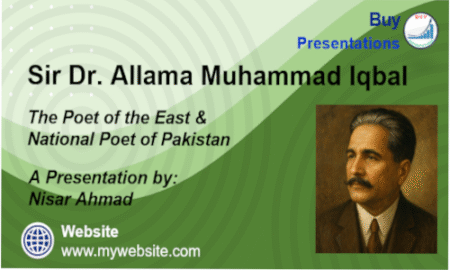Allama Iqbal: The Visionary Poet and Philosopher of the East
Introduction
Sir Dr. Allama Muhammad Iqbal — often revered as the Poet of the East (Shair-e-Mashriq) — was not only a literary genius but also a philosopher, reformer, and visionary whose ideas inspired the creation of Pakistan. His poetry awakened the spirit of selfhood among Muslims of the Indian subcontinent and continues to inspire millions across the world.
Early Life and Education
Allama Iqbal was born on November 9, 1877, in Sialkot, a city in present-day Pakistan. His father, Sheikh Noor Muhammad, was a devout Muslim, and his mother, Imam Bibi, was known for her compassion and wisdom.
Iqbal’s early education took place in Sialkot, where he studied Arabic and Persian. Later, he attended Government College Lahore, earning degrees in philosophy and English literature. His thirst for knowledge took him abroad — first to Cambridge University for a degree in philosophy, then to Lincoln’s Inn in London to qualify as a barrister, and finally to the University of Munich, where he earned his PhD in philosophy.
Academic & Professional Career
Upon returning to India, Iqbal began teaching philosophy and English literature at Government College Lahore. His academic brilliance quickly earned him recognition as a scholar of deep thought and creative expression. Alongside teaching, he practiced law and became a prominent intellectual voice in the subcontinent.
Literary Contributions
Iqbal’s poetry — written in Urdu and Persian — blended deep spirituality with calls for action, self-realization, and unity. Some of his most celebrated works include:
- Bang-e-Dra (The Call of the Marching Bell)
- Asrar-e-Khudi (Secrets of the Self)
- Rumuz-e-Bekhudi (Mysteries of Selflessness)
- Payam-e-Mashriq (Message of the East)
His poetic philosophy emphasized Khudi — the concept of self-awareness and empowerment — urging individuals to rise above limitations and realize their divine potential.
Philosophical Vision
Iqbal’s philosophy merged Islamic thought with modern philosophy. He envisioned a spiritual and moral revival of the Muslim world. His concept of Khudi encouraged human dignity, independence, and creative power, while his idea of Mard-e-Momin (the true believer) symbolized courage, selflessness, and divine consciousness.
Political Role
Beyond poetry, Iqbal was an active political thinker. In his famous Allahabad Address of 1930, he proposed the idea of a separate homeland for Muslims — planting the intellectual seed for the creation of Pakistan. His vision inspired leaders like Quaid-e-Azam Muhammad Ali Jinnah and became the foundation of the Pakistan Movement.
Recognition and Titles
In recognition of his scholarly and poetic excellence, the British government knighted him in 1922, granting him the title “Sir.” He is also honored as “Dr.” for his academic achievements, and most importantly, remembered as “Allama” — a title denoting immense knowledge and wisdom.
Legacy
Allama Iqbal’s influence extends far beyond poetry. He reshaped modern Muslim thought and inspired generations to embrace education, faith, and self-respect. In Pakistan, his birthday on November 9th is celebrated as Iqbal Day, a national holiday commemorating his lasting contributions to the nation’s identity and ideology.
Famous Quotes
“Khudi ko kar buland itna ke har taqdeer se pehle,
Khuda bande se khud pooche, bata teri raza kya hai.”
(Elevate your selfhood so high that before every destiny, God Himself asks you what you desire.)
“Nations are born in the hearts of poets; they prosper and die in the hands of politicians.”
Death and Remembrance
Allama Iqbal passed away on April 21, 1938, in Lahore. He rests in peace near the Badshahi Mosque, where his tomb stands as a symbol of Pakistan’s spiritual and intellectual foundation. His vision continues to live in the hearts of those who strive for self-discovery, freedom, and faith.
Conclusion
Allama Iqbal was more than a poet — he was a thinker who reshaped the destiny of nations through words and wisdom. His message of self-realization, love, and faith remains timeless. For educators, students, and presenters, his life offers endless inspiration to explore through thoughtful presentations and storytelling.
Credits
Prepared by the team at Buy Presentations, your trusted partner for premium PowerPoint templates and custom presentation design. Whether you’re creating a presentation on Allama Iqbal’s philosophy or any historical or educational topic, we can help you design it beautifully and professionally.

Leave a Reply